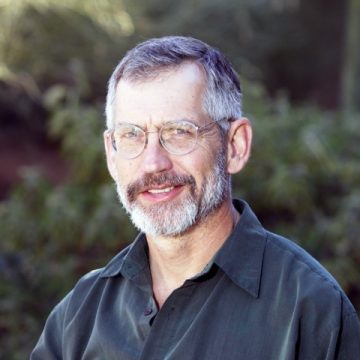Joe Mcauliffe
Director Emeritus & Senior Research Scientist

RESEARCH INTERESTS
- Plant community ecology
- Population ecology of long-lived perennial plants of deserts
- Plant-soil relationships and ecophysiology
- Multidisciplinary collaborations involving geology, soil science, hydrology and ecology
- Paleoecology and paleoclimatology
- Ecology and conservation of semi-arid grasslands
PERSONAL STATEMENT
During the last 20 years, the most challenging and interesting research problems on which I have worked have involved collaborations with scientists from other disciplines, including geology and soil science. Knowledge from these areas has greatly broadened my understanding of the natural history and ecology of arid environments. Indeed, I realize now that there are so many ecological questions that cannot be adequately addressed unless the context of geology, soils, and soil hydrology is considered and understood. This multidisciplinary perspective not only leads to a growth of basic knowledge of arid lands, it also is necessary for dealing with many pressing conservation problems.
SELECTED PUBLICATIONS
McAuliffe, J.R. 2016. Perennial grass-dominated plant communities of the eastern Mojave Desert region. Desert Plants 32(1): 1-90.
McAuliffe, J.R., L.D. McFadden, L.M. Roberts, T.F. Wawrzyniec, L.A. Scuderi, G.A. Meyer, and M.P. King. 2014. Non-equilibrium hillslope dynamics and irreversible landscape changes at a shifting pinyon-juniper woodland. Global and Planetary Change 22:1-13.
McAuliffe, J.R., M.T. Hoffman, L.D. McFadden, and M.P. King. 2014. Role of aeolian sediment accretion in the formation of heuweltjie earth mounds, western South Africa. Earth Surface Processes and Landforms 39:1900-1912.
Goodman, J., J. Maschinski, P. Hughes, J. McAuliffe, J. Roncal, D. Powell and L.O. Sternberg. 2012. Differential response to soil salinity in endangered key tree cactus: Implications for survival in a changing climate. PLoS ONE 7(3): e32528. doi:10.1371/journal.pone.0032528
McAuliffe, J.R. 1994. Landscape evolution, soil formation, and ecological patterns and processes in Sonoran Desert bajadas. Ecological Monographs 64:111-148. (Awarded the William Skinner Cooper Award in 1995by the Ecological Society of America)
McAuliffe, J.R. and T.R. Van Devender. 1998. A 22,000-year record of vegetation change in the north-central Sonoran Desert. Palaeogeography, Palaeoclimatology, Palaeoecology 141:253-275.
McAuliffe, J.R. 1999. The Sonoran Desert: Landscape complexity and ecological diversity. Pp. 69-114 in R. Robichaux, ed. Ecology of Sonoran Desert Plants and Plant Communities. University of Arizona Press, Tucson.
McAuliffe, J.R. 2003. The interface between precipitation and vegetation: The importance of soils in arid and semi-arid environments. Pp. 9-27 in: J.F. Weltzin and G.R. McPherson (eds.) Changing Precipitation Regimes in Terrestrial Ecosystems: A North American Perspective. University of Arizona Press, Tucson, Arizona.
McAuliffe, J.R. and E.V. McDonald. 2006. Holocene environmental change and vegetation contraction in the Sonoran Desert. Quaternary Research 65:204-215.
McAuliffe, J.R., E.P. Hamerlynck, and M.C. Eppes. 2007. Landscape dynamics fostering the development and persistence of long-lived creosotebush (Larrea tridentata) clones in the Mojave Desert. Journal of Arid Environments 69:96-126.
J.R. McAuliffe and E.P. Hamerlynck. 2010. Perennial plant mortality in the Sonoran and Mojave deserts in response to severe, multi-year drought. Journal of Arid Environments 74:885-896.